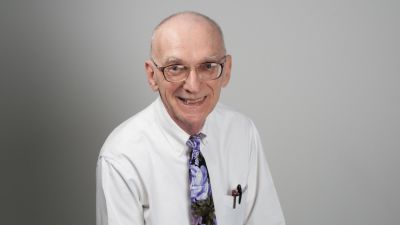A Lifetime of Service

Teacher, mentor, archivist, researcher, and humanitarian, Dr. Jerry Pfabe came to Concordia in 1967 to teach history and secondary social studies methods. In 1970, he became the archivist.
Archives are important programs for institutions because they help chronicle what happened at the school and enable us to understand some of the dynamics of campus and campus life that we wouldn’t have without. Whether it’s a photograph or student newspaper, it helps to understand what life was like in the past.
“It’s a painstaking kind of work where you have to make decisions about organization, gathering, and what to keep,” said Pfabe. “We can’t keep everything and it is sometimes hard to decide. I always ask myself, ‘50 years from now, is anyone going to want to see that, or is it going to be useful to document the institution?’ Sometimes I think I’m a terrible archivist because I love to throw things away. But, I don’t think I’ve ever had someone come up to me and ask, ‘do we have’ something I’ve pitched.”
For instance, Pfabe has a photograph of the Concordia football team from 1944. “Because this was during World War II, the school had to form a 6-man football team. There was only one year during the war when Concordia didn’t have football.”
“Historians study change and talk about continuity, and one of the big continuities is the Christ-centered character of Concordia.”
Pfabe actually retired in 2010, but still keeps busy with the archives and teaches two Spanish classes. In fact, a familiar sound around the campus each holiday season is Professor Pfabe and his students singing Christmas carols in Spanish.

Pfabe says his favorite things about teaching are the interactions he gets with students, hearing their ideas and challenging their thinking.
“Learning a different language can be difficult, but if they’re willing to try and give an effort, they can learn it. It takes patience, it isn’t going to happen overnight.”
Pfabe has spent a significant amount of time in Latin America. He lived in Mexico one semester while on sabbatical; his other sabbatical was in Costa Rica. He has also studied the ruins of indigenous cultures in Mexico and Central America. He has been to all the nations of Central America, as well as Brazil, Peru, and Chile.
While in Mexico and Costa Rica, he saw first-hand poverty and hunger. “As a Christian, I think any human being should care for other human beings. When we recognize God’s love for us and what Christ did for us, those people are recipients of Christ’s love as well and I.”
Approximately 20 years ago, Dr. Pfabe began researching divorces in Seward County. He became interested in the subject while teaching history at Concordia. He spent time at the Seward County Courthouse delving into the history of Seward and discovered some interesting stories about the laws and court decisions involving marital disharmony. After analyzing the causes and outcomes of divorce degrees, he submitted his findings to “Nebraska History Magazine” and it was published in the 2016 fall issue.
Pfabe and his wife, Esther have been married more than 56 years and they have three grown daughters and six grandchildren.
Pfabe received the Outstanding Teaching Award from Concordia in 1983. “As long as I feel that I can still teach reasonably well, and that the school can still use me, I’ll still teach.”
There is much more about Dr. Pfabe and the archives, visit https://www.cune.edu/about/archives/